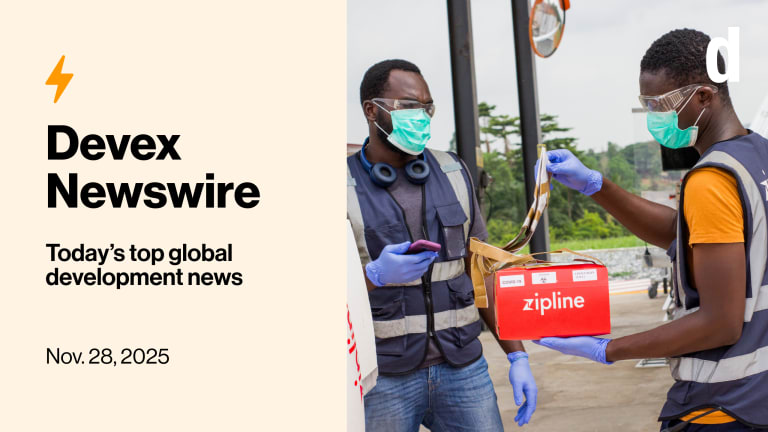
Youth economic development is increasingly important with more than 1.8 billion young people in the world today, changing demographics, the Arab Spring, and the need to counter violent extremism where many youth are unemployed and disaffected. How can we help youth successfully join the workforce? After 15 years of working on youth economic development in the Middle East, Africa, Eastern Europe and the Caribbean, I believe the formula for success varies from place to place, but there are four elements that should always be included.
The selection process matters
Selecting youth to participate in an economic development program is always a challenge. Do you select the neediest? The most entrepreneurial? Those with the highest test scores? Or the lowest? There is no clear winner, but I think the best decisions are made when the selection process brings program staff, trainers and employers together to select trainees.
Each of these groups evaluates youth candidates through a different lens. Program staff tend to favor youth in greatest need of support. Trainers look for learning ability and an attitude that says, “I will be fully engaged in class.” Employers look for people they would hire, those who will be prompt, work well in teams and be willing to work their way up. When program staff, trainers and employers jointly agree on the selection of candidates, those young people tend to be more appropriate for the given opportunity, and are therefore likely to be more successful in training, job placement and retention.
See more stories from #YouthWill Create Opportunity:
● Ways out of the global youth unemployment crisis
● Investing in youth skills is a no-brainer
● Which countries have the highest (and lowest) youth unemployment rate?
● How data could help Tanzania's young informal workers
● Don't change the player, change the game
● Rebranding agriculture as a business for youth in Africa
● In Maldives, a country-led youth entrepreneurship movement blooms
● What works in Technoserve's largest youth program?
● How private sector can address skills gap
Engage family and community
Just as trainers and employers have a stake in a young person’s future, so do family and community. Without family and/or community approval, youth may lack the means and social support necessary to succeed. Too often, they drop out of class, skip internships and fail to get jobs or start businesses simply because their families or community leaders disapprove.
In Jordan, while training youth to work in the hospitality industry, Chemonics engaged the parents of young female trainees, taking them on a tour of a hotel where the young women might find work as housekeepers. The hotel’s managers presented the details of the job, the work environment, prospective fellow workers and hotel guests. Parents shared their concerns with hotel managers, and together they reached consensus on acceptable solutions. Without this parental engagement, many of the young female trainees would not have been allowed to accept jobs in the hotel, despite solid training and qualifications.
Be clear about expectations
Employers often tell me that youth lack the right “soft skills” and that they want to become managers as soon as they are hired. While I firmly believe we must equip youth with soft skills so that they can become good communicators, collaborate and behave professionally, soft skills are not enough. We also need to expose them to real workplaces and career guidance to help them set realistic expectations. We should provide them with access to a mentor or role model with whom they can discuss sensitive issues such as salaries, career pathways, and the realities of the day-to-day work environment. I have met too many young men who quit their first jobs post-training because they quickly realized they wouldn’t earn enough money to get married in a year or two. Young women too, need access to real-world role models, such as female owners of local businesses — not the elite tycoons they see on TV.
Young people also need to understand the range of opportunities available to them, rather than simply choosing to do the same as their friends and relatives. They need to see that entry level jobs are respectable and can lead to greater responsibility in the workplace. Through exposure to role models and employers, parents too can develop a more positive view of various jobs and career pathways.
Design for ‘your’ youth
When talking about youth programming, I am often asked to define youth by age range. However, the category of “youth” is so broad that we need to dig deeper than age to understand the nuances of the particular population. Understanding the realities of the young people we work with helps us design the right program for them. What is their level of education and literacy? Are they marginalized? Are they expected to contribute to their families’ finances? Are their career choices constrained by societal prejudices or ignorance?
I’m also asked whether it’s better to use off-the-shelf youth development tools, which can be quickly deployed, or to create tailored tools for specific populations. While it can be tempting to use ready-made tools, it’s more important to fully understand the target population, and what and how they need to learn. The right tools might be new or adaptations of existing tools developed for that specific environment or population. The most effective tools are often selected, developed or adapted jointly by employers, trainers and the youth themselves.
When we combine these elements, we can help youth become drivers of stability and economic opportunity. The key to success is the active engagement of stakeholders who influence young people’s lives. Family, community, trainers, employers and mentors should be involved in youth programs from the beginning to end. Together, they provide the network of support, encouragement, expertise and opportunities that enable youth to learn, build confidence, take chances and become positive stewards of their countries.
Want to learn more? Check out the Youth Will website and tweet #YouthWill.
Youth Will is an online conversation hosted by Devex in partnership with Chemonics, The Commonwealth Secretariat, The MasterCard Foundation and UN-Habitat to explore the power that youth around the globe hold to change their own futures and those of their peers.








